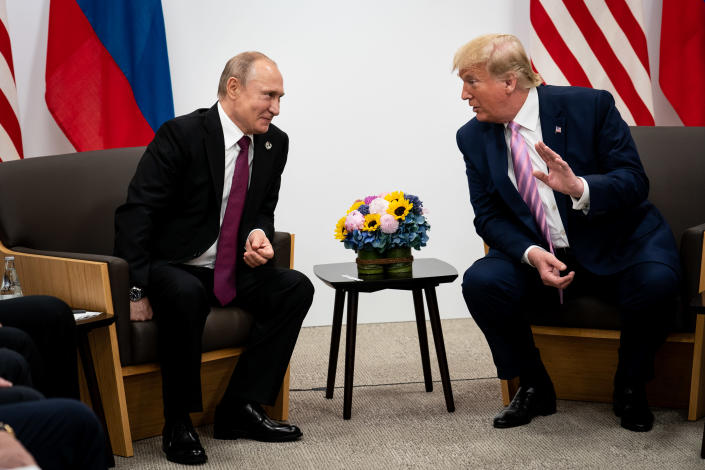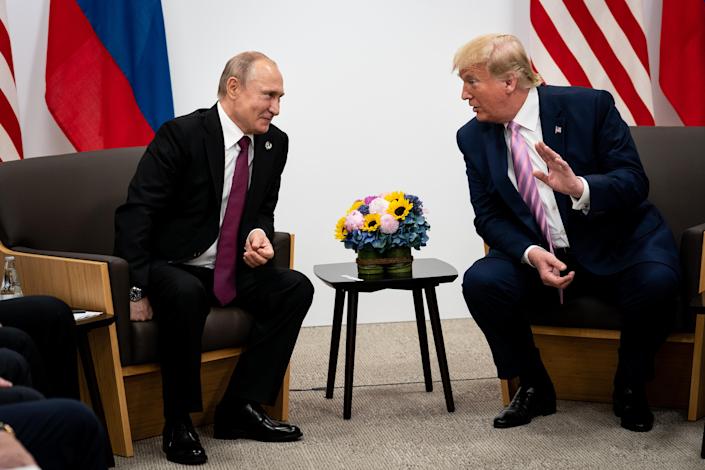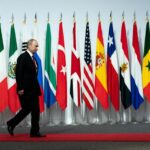
ROME — For years, a global choir of right-wing politicians has sung the praises of Vladimir Putin. They looked up to the Russian strongman as a defender of closed borders, Christian conservatism and bare-chested machismo in an era of liberal identity politics and Western globalization. Fawning over him was a core part of the populist playbook.
But Putin’s savaging of Ukraine, which many of his right-wing supporters had said he would never do, has recast the Russian president more clearly as a global menace and boogeyman with ambitions of empire who is threatening nuclear war and European instability.
For many of his longtime admirers — from France to Germany and the United States to Brazil — it is something of an awkward spot. The stain of Putin’s new reputation threatens to taint his fellow travelers, too.
Sign up for The Morning newsletter from the New York Times
“It will be a decisive blow to them,” said Lucio Caracciolo, editor of the Italian geopolitical magazine Limes, who considered Putin’s invasion an irrational, and potentially, a politically suicidal move.
He said that members of the international ultraright who enjoyed a special relationship and financial support from Putin were “in serious trouble.”
“They put all their eggs in the same basket,” Caracciolo said. “And the basket is collapsing.”
Perhaps no one demonstrates the quandary more than Matteo Salvini, Italy’s leading right-wing politician, who has been an unapologetic Putin fanboy.
He wore shirts with Putin’s face on them in Moscow’s Red Square and in the European Parliament. He said he preferred the Russian president to the Italian one. He incessantly echoed Putin’s calls to end the sanctions already on Russia for its annexation of Crimea. He mocked those who alleged he was in Putin’s pocket by saying, “I esteem him for free, not for money.”
Like some other right-wing leaders, he is now seeking to thread the narrowest of needles by condemning the violence, or even Russia, but not Putin by name, or condemning the violence but making excuses for it with anti-NATO talking points.
While some of his cohort have admitted that they perhaps assessed Putin incorrectly, Salvini has not been ready to make such a concession.
On Thursday, he wrote on Twitter that he firmly condemned “any military aggression,” and then dropped off flowers at the Ukrainian Embassy. He eventually came around to acknowledging that Russia was the military aggressor but still seems to have trouble bringing himself to utter criticism and Putin’s name in the same sentence.
“I am let down by the human being who, in 2022, tries to solve economic and political problems with war,” Salvini said in a radio interview. (Salvini’s spokesperson, Matteo Pandini, insisted that he had also said “Putin started a war and so Putin is wrong” but could not point to where he had said it.)
The Italian finds himself in familiar company when it comes to European leaders who are now struggling to countenance their past support for Putin with the war of choice he is waging on their continent. The cast of former Putin apologists wrestling with apologies reads like a Who’s Who of the populist ascendancy of 2018.
In France, Putin’s war has prompted a politically painful, and possibly costly, about-face before presidential elections in April. Far-right candidates who spent years praising the Russian leader and weeks downplaying the risk of an invasion reassessed Putin and the electoral benefit of being in his corner.
Marine Le Pen, leader of the far-right National Rally party — which received a loan from a Russian bank — declared that Russia’s annexation of Crimea was not illegal and visited Putin in Moscow before the last presidential elections in 2017. While she opposes NATO, Le Pen denounced Putin’s military aggression Friday, saying, “I think that what he has done is completely reprehensible. It changes, in part, the opinion I had of him.”
Her far-right rival in the presidential campaign, Éric Zemmour, has in the past called the prospect of a French equivalent of Putin a “dream” and admired the Russian’s efforts to restore “an empire in decline.” Like many other Putin enthusiasts, he doubted an invasion was in the cards and blamed the United States for spreading what he called “propaganda.”
But Thursday he, too, denounced the invasion, saying “Russia was neither attacked nor directly threatened by Ukraine” in a speech given at a lectern that, to make things extra clear, displayed a sign reading, “I fully condemn the Russian military intervention in Ukraine.”
In Britain, Nigel Farage, a key proponent of Brexit, had not believed that Russia would invade Ukraine.
“Well, I was wrong,” he wrote on Twitter on Thursday, although he maintained that the European Union and NATO had unnecessarily provoked Russia with expansion. “Putin has gone much further than I thought he would.”
Other right-wing forces around Europe have sought to square the circle by condemning the violence but shifting the blame away from Putin.
Alexander Gauland, a key figure in Germany’s far-right Alternative for Germany party, known by its German initials AfD, told the daily Neuer Osnabrücker Zeitung on Thursday that the invasion was a “result of past failures” and put the blame on NATO’s eastward expansion after the Cold War for violating “Russia’s legitimate security interests.” Putin has been more popular in the formerly communist-ruled eastern part of Germany, where the AfD has its political base.
Petr Bystron, a foreign affairs spokesperson for the party, visited Moscow with a delegation of its lawmakers last year. He issued a statement in which he “regretted” current developments but added, “We must not now make the mistake of attributing sole responsibility for this development to Russia.”
“It is a sign of their ideological closeness to Putin’s aggressive nationalism,” said Hajo Funke, a prominent German scholar of the country’s far right.
Putin’s supporters are by no means limited to Europe.
In the United States, former President Donald Trump, whose term in office was marked with solicitousness to the Russian leader that confounded his Western allies, said Wednesday that Putin was “very savvy” and made a “genius” move of declaring regions of Ukraine as independent states as a predicate to move in the Russian military.
Those remarks left Trump an outlier in the Republican Party of which he is the de facto leader. But he was not totally isolated.
Trump’s media cheerleader, Fox News host Tucker Carlson, urged Americans to ask themselves what they had against Putin and echoed the Kremlin as he denigrated Ukraine as not a democracy but a puppet of the West and the United States that was “essentially managed by the State Department.” After the invasion, he, too, moderated, warning of “a world war” and saying “Vladimir Putin started this war, so whatever the context of the decision that he made, he did it.”
The last major leader to visit Putin before the war, President Jair Bolsonaro of Brazil, who was once told by Putin that he expressed “the best masculine qualities,” has decided instead to hold his tongue. But he perhaps showed his hand when he rebuked his vice president for saying that Brazil opposed the Russian invasion of Ukraine.
But it was perhaps Putin’s old friends who seemed most stunned by the attack.
Silvio Berlusconi, a former prime minister of Italy who wore furry hats with the Russian in his dacha in Sochi and received a “big bed” from Putin as a gift, has condemned the violence but had not said anything publicly about his old pal. It’s not clear whether he had reached out to Putin, but he apparently told his party’s members in a phone call that he was putting his international relations at the service of peace and the defense of Europe.
“I spoke to Berlusconi last night. He is very worried and is almost terrified by what is happening,” Giorgio Mulè, an undersecretary of defense in Berlusconi’s party, said on Italian radio Friday. He added, “He just doesn’t see in Vladimir Putin the person he’d known.”
© 2022 The New York Times Company




